Key takeaways:
- Reparations in economic education should incorporate historical context to help students understand systemic inequalities faced by marginalized groups.
- Current debates on reparations extend beyond financial compensation to include investments in education, healthcare, and community development.
- Economic models supporting reparations include wealth redistribution through progressive taxation and investment in marginalized communities.
- Implementing educational frameworks that combine experiential learning and interdisciplinary approaches fosters deeper understanding and community engagement.
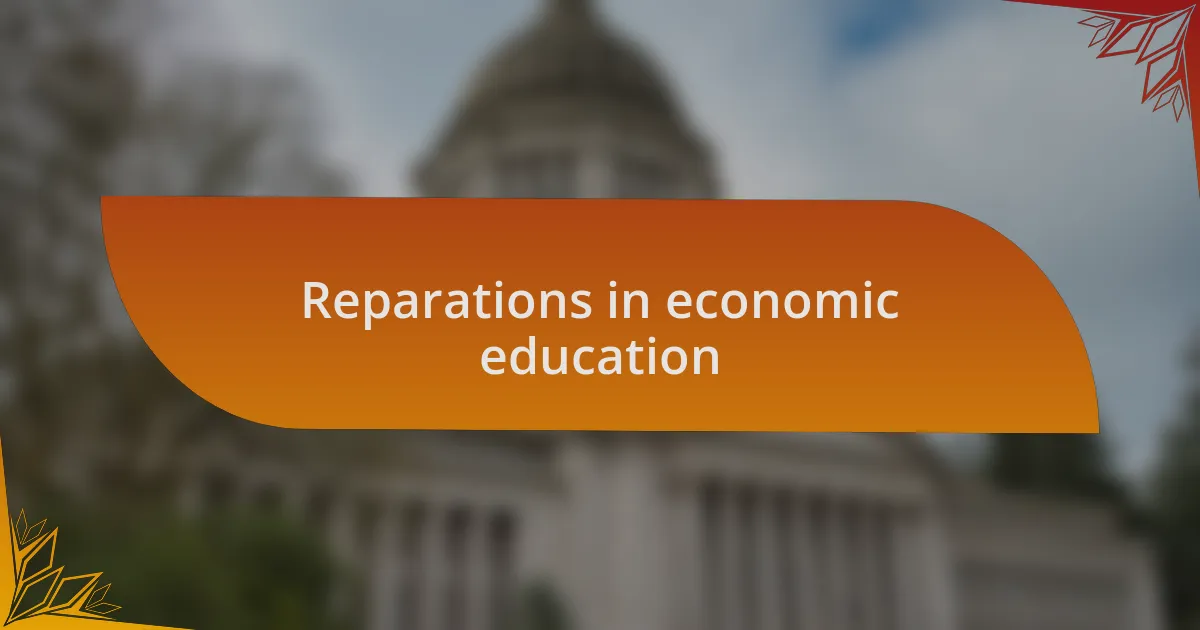
Reparations in economic education
When I think about reparations in economic education, I’m often reminded of how personal experiences shape our understanding of these concepts. Growing up, I watched my community struggle with the long-term effects of historical injustices, and I realized that economic education rarely addresses these disparities. How many people are really aware of the systemic barriers that have limited access to wealth-building opportunities for marginalized groups?
In my own journey, I sought out financial literacy programs that aimed to bridge this gap, and I found that they often fell short. They tended to focus on individual choices but didn’t confront the broader societal context of economic inequality. Isn’t it crucial for economic education to acknowledge the historical forces at play? By incorporating reparations into these discussions, educators can help students understand how to navigate and challenge these entrenched inequities.
I often wonder about the potential impact of introducing reparations discussions in classrooms. Imagine a curriculum that not only teaches economics but also explores the moral imperative of reparations. It’s about creating conversations that resonate emotionally and intellectually. Through this lens of understanding, we can equip the next generation to become advocates for a more equitable economic future.
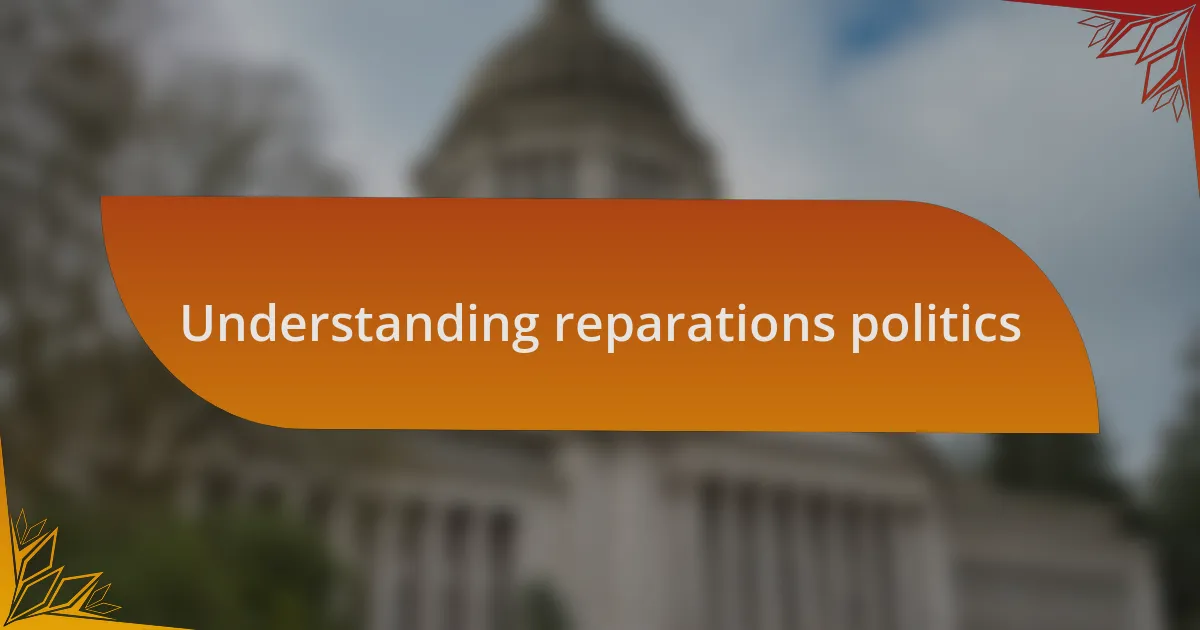
Understanding reparations politics
Reparations politics is a complex and often controversial topic that intersects with history, morality, and economics. I remember sitting in discussions where people passionately debated whether financial reparations could truly rectify centuries of systemic oppression. The complexity arises not just from the logistics but also from differing perspectives on what justice looks like for those affected.
In my experience, understanding reparations requires acknowledging the deep scars left by discrimination and inequality. Many might ask, can money alone heal these wounds? I believe it’s about more than just financial compensation; it’s about recognizing the historical context and promoting reparative actions that empower communities. Reparations should spark conversations around equity and justice, not just be treated as a monetary transaction.
Moreover, I’ve seen how discussions around reparations can open up new pathways for dialogue about the value of historical acknowledgment in economic education. When I reflect on these conversations, I feel that they remind us of a shared responsibility to advocate for systemic change. Isn’t it pivotal that we explore these narratives in our educational frameworks so that future generations can truly understand the implications of our past?
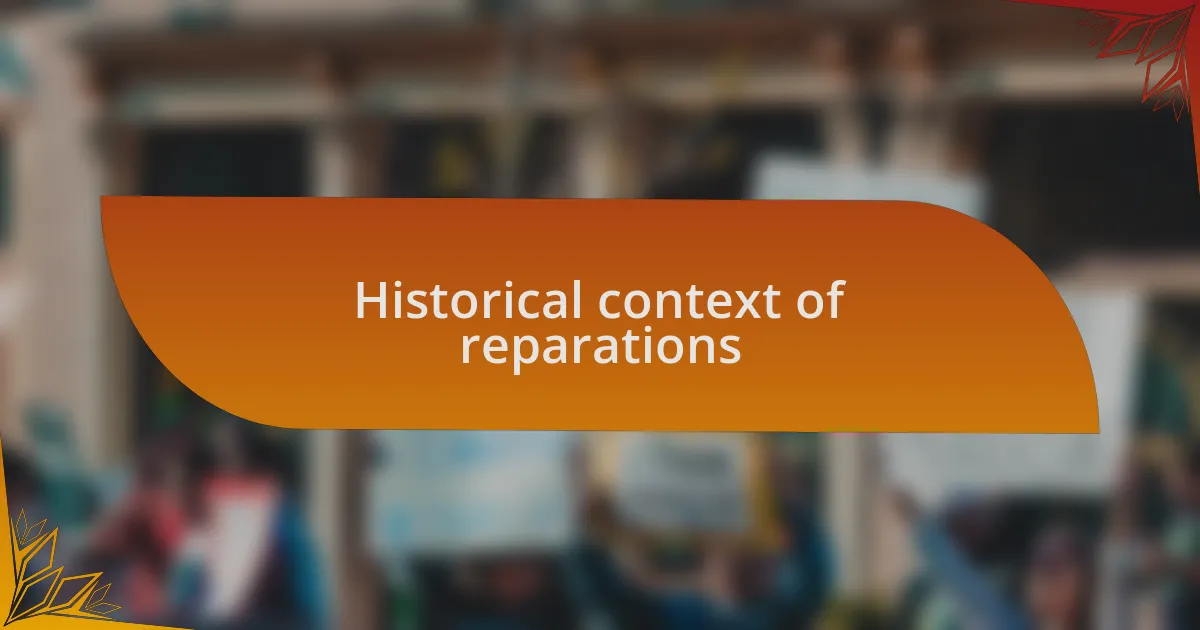
Historical context of reparations
Throughout history, the notion of reparations has surfaced in various forms, driven by the need to address injustices enacted by colonialism, slavery, and systemic discrimination. In discussions I’ve participated in, I’ve noticed how people often express skepticism about reparations, questioning their efficacy in resolving deep-rooted issues. Yet, when we dive into the historical context, it becomes clear that reparations have been sought in different societies as a means to confront past harms and begin the healing process.
Take the case of the 1865 Land Grant for formerly enslaved people in the U.S. It was a moment filled with hope—one that promised a chance at economic independence and stability. That’s an emotional turning point for many, isn’t it? However, the promise was swiftly broken, leaving a legacy of disappointment that resonates today. Reflecting on such moments makes me wonder: how can we learn from these historical missteps in our discussions about reparations today?
In my view, the history of reparations reminds us that this isn’t merely about financial compensation, but rather an acknowledgment of the profound wrongs that have occurred. As I’ve listened to stories from communities affected by historical injustices, I’ve felt a sense of urgency. These narratives signify a collective memory that we cannot afford to overlook. So, what can history teach us? It urges us to advocate for reparative measures that are nuanced and reflective of the complex journeys of those impacted.
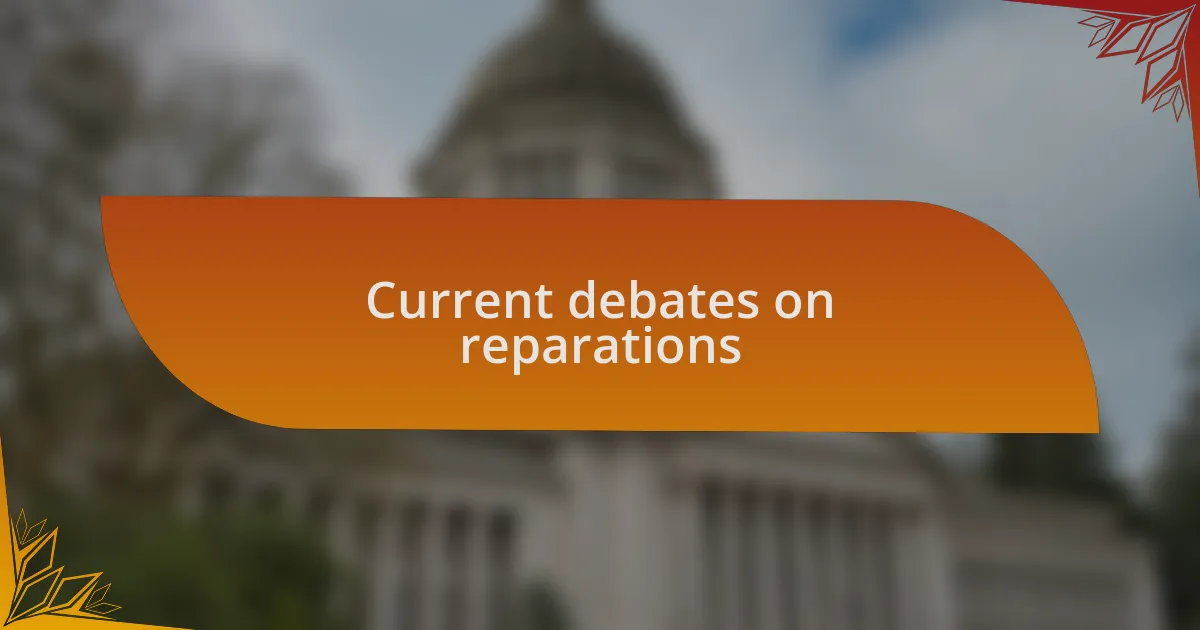
Current debates on reparations
Current debates on reparations take on many dimensions. Recently, I’ve found conversations centered around whether reparations should be purely monetary or if they could also include investments in education, healthcare, and community development. This sparks a question I often ponder: can we create a truly equitable framework if we only focus on financial compensation? It seems to me that the heart of the matter lies in understanding the multifaceted nature of reparations, beyond just checks being written.
Furthermore, the conversation surrounding who should qualify for reparations is deeply contentious. For instance, should it extend to descendants of enslaved individuals, or should it also encompass those marginalized by systemic inequities? I can recall a discussion where one participant fervently argued that, without clear parameters, we risk diluting the essence of reparations. This leads me to wonder how we can establish criteria that ensure fairness while honoring the legacies of those affected.
Lastly, I see a growing debate on the potential economic impact of reparations. Critics often warn about the financial burden on taxpayers or the consequences of redistributing wealth. Yet, from my perspective, investing in marginalized communities could create a ripple effect of economic benefits for society as a whole. Isn’t it worth exploring how reparative investments might contribute to a healthier, more equitable economy? Engaging in such discussions feels vital as we navigate the complex terrain of reparations and their implications for the future.
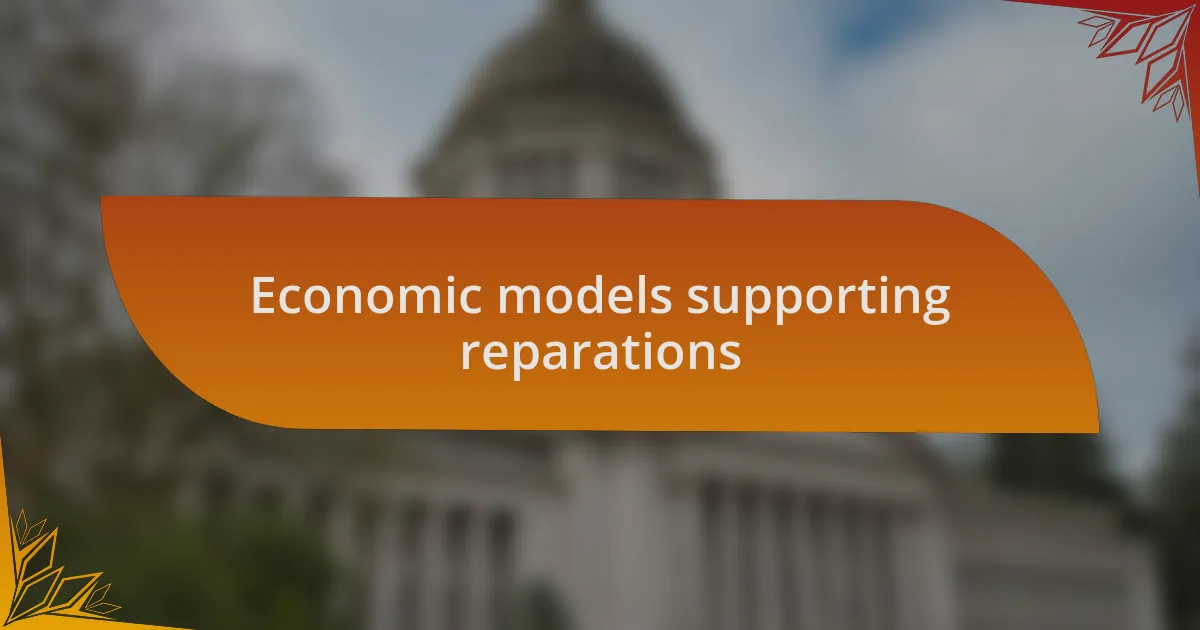
Economic models supporting reparations
Let’s delve into the economic models that bolster the case for reparations. One powerful approach is the concept of wealth redistribution through progressive taxation. In my view, such a model doesn’t merely seek to rectify past injustices but also promotes a fairer economic landscape moving forward. Have you ever considered how slightly higher tax rates on the wealthiest could funnel resources into community programs and initiatives aimed at healing historical wounds? By reimagining tax structures, we can create a more equitable society.
Another compelling model is the investment in quality education and job training programs within marginalized communities. I’ve witnessed firsthand the transformative impact education can have on individuals. When I volunteered at a local after-school program, the students’ enthusiasm for learning reminded me just how much potential exists in every overlooked community. Supporting reparations through educational investment not only uplifts individuals but also strengthens the economy by fostering a more skilled workforce. The question remains: how can we ensure that these educational opportunities are both accessible and relevant to those who need them most?
Additionally, considering a model rooted in community-oriented economic development piques my interest. This approach advocates for strategic investments in local businesses and infrastructure in historically underserved areas. I recall a discussion about a small business in a disenfranchised neighborhood that thrived once given the right support; the ripple effects on employment were profound. By prioritizing economic development alongside reparations, we can cultivate resilience within communities and address the root causes of poverty and inequality. Wouldn’t it be profound to see communities blossom as we invest in their future?
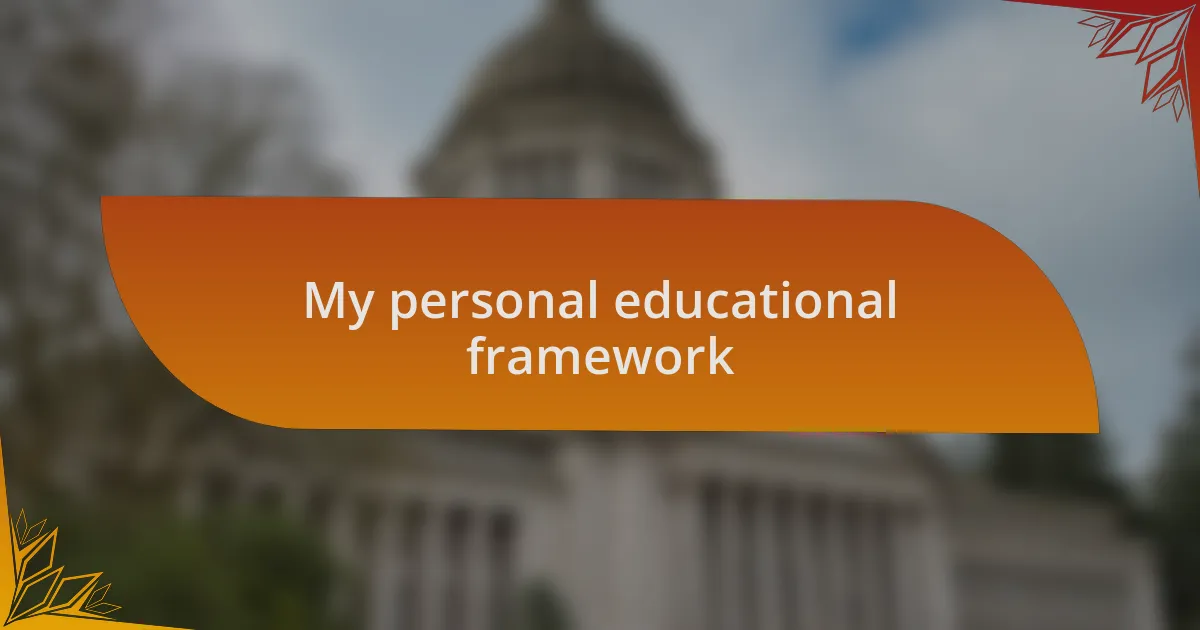
My personal educational framework
My personal educational framework revolves around integrating economic literacy with historical context. I believe understanding the economic implications of reparations should begin with a deep dive into the history of systemic inequities. For instance, during my time teaching a community workshop, I noticed how revealing the economic injustices faced by marginalized groups sparked genuine interest and engagement among participants. It made me realize education is not just about imparting knowledge but also about empowering individuals to connect the dots between history and their current economic reality.
I also emphasize experiential learning as a key aspect of my educational approach. Reflecting on my own experiences, I remember a project where students created simulated business plans that addressed real community issues. This hands-on method not only fostered creativity but also instilled practical skills essential for navigating the economic landscape. Have you ever experienced the joy of applying knowledge in a real-world context? It’s a powerful reminder that education should be a bridge to actionable change.
Moreover, I advocate for interdisciplinary learning, where economics, sociology, and history intersect. In my workshops, I often encourage diverse discussions, allowing participants to share their viewpoints and experiences. Once, a conversation sparked by a guest speaker led to a breakthrough moment, where attendees recognized their collective potential to influence local economic policies. I find that when we unite different perspectives, the quest for economic justice becomes a shared journey, fostering both personal and communal growth. Isn’t it fascinating how collaboration can inspire greater understanding and action?
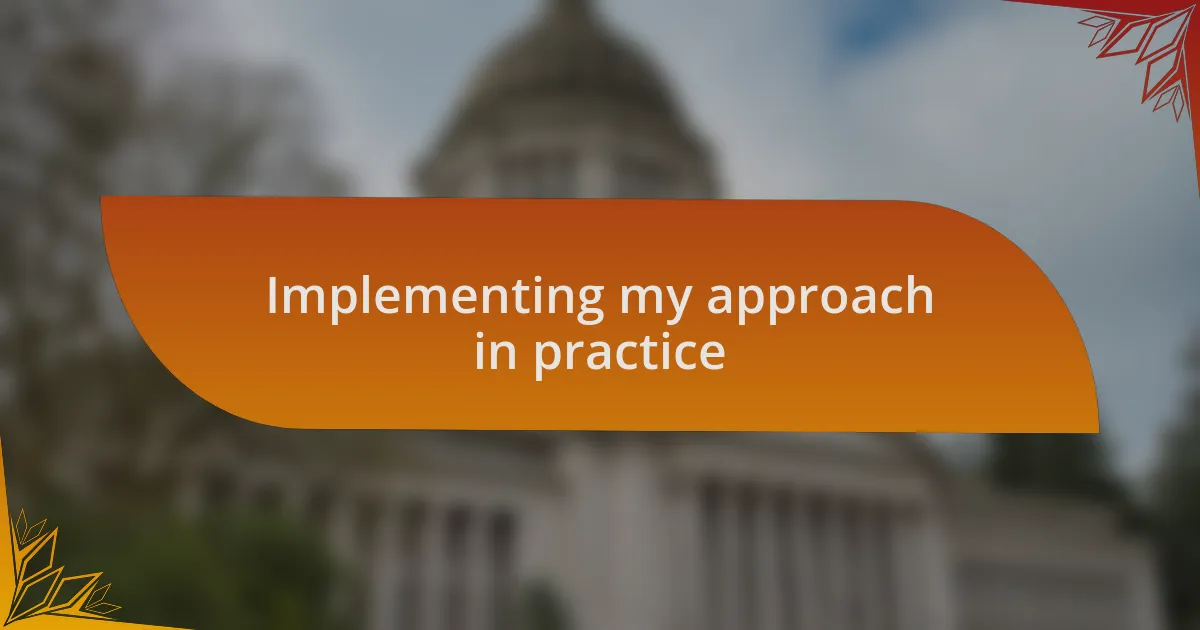
Implementing my approach in practice
Implementing my approach in practice involves tailoring workshops to suit various community needs, which often means adapting content to resonate with different audiences. For example, during a recent session focused on young adults, I incorporated case studies that visually highlighted the financial burdens of student debt. The look of realization on their faces when they connected that burden to broader economic policies was priceless. How many times have we overlooked the personal impacts of abstract economic concepts?
I also prioritize collaboration with local organizations to create a network of support and resources. In one collaboration, a nonprofit partner helped provide materials for a project that examined the historical impact of redlining in our community. Participants were able to analyze real data, which prompted robust discussions about the long-term effects on local economic stability. It was illuminating to witness how hands-on engagement could turn complex statistics into relatable stories that foster deeper understanding.
Furthermore, I strive to create an environment where feedback drives continuous improvement. After a workshop on financial literacy, I invited participants to share their thoughts on the session’s effectiveness. Their candid insights revealed not only what resonated but also areas where they felt underserved. This feedback loop not only empowers them but also reinforces my belief that the education we provide should evolve alongside the communities we serve. When we listen, we learn, right?